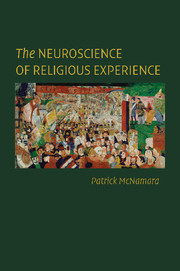Book contents
- Frontmatter
- Contents
- Preface
- Acknowledgments
- 1 God and the Self
- 2 On the Self and the Divided Self
- 3 Mechanisms and Dynamics of Decentering
- 4 Neurology of the Self
- 5 Neurology of Religious Experiences
- 6 Neurochemistry of Religiosity
- 7 Self-Transformation as a Key Function of Performance of Religious Practices
- 8 Self-Transformation through Spirit Possession
- 9 God Concepts
- 10 Religious Language
- 11 Ritual
- 12 Life-Span Development of Religiosity and the Self
- 13 The Evolution of Self and Religion
- References
- Index
11 - Ritual
Published online by Cambridge University Press: 30 October 2009
- Frontmatter
- Contents
- Preface
- Acknowledgments
- 1 God and the Self
- 2 On the Self and the Divided Self
- 3 Mechanisms and Dynamics of Decentering
- 4 Neurology of the Self
- 5 Neurology of Religious Experiences
- 6 Neurochemistry of Religiosity
- 7 Self-Transformation as a Key Function of Performance of Religious Practices
- 8 Self-Transformation through Spirit Possession
- 9 God Concepts
- 10 Religious Language
- 11 Ritual
- 12 Life-Span Development of Religiosity and the Self
- 13 The Evolution of Self and Religion
- References
- Index
Summary
Look at nothing in defiance of ritual, listen to nothing in defiance of ritual, speak of nothing in defiance of ritual, never stir hand or foot in defiance of ritual.
– Confucius, The Analects or Lunyu 12.1Introduction
Many religion scholars believe that religious rituals are a major source of the world's religions (i.e., that religion is rooted in ritual). Whether this is the case, there is little doubt that attaining a better understanding of religious rituals may give us a better understanding of religion in general. In recent years, anthropological and cognitive approaches to ritual behaviors and ritual form have registered some remarkable advances (Bloch, 1974; Humphrey & Laidlaw, 1994; Lawson & McCauley, 1990; Liénard & Boyer, 2006; McCauley & Lawson, 2002; Rappaport, 1999; Seaquist, 2006). I will try to build on these advances by systematically examining psychological and cognitive effects of ritual behavior on the individual.
To forecast my conclusions regarding the nature and functions of ritual, I find that, with respect to its effects on the individual, religious rituals often involve a reduction in agency/volition. The individual sets aside his or her own immediate intentions and instead performs actions stipulated by others – such as gods and ancestors, long ago. Religious rituals also constrain the decentering process in such a way as to facilitate selection of a new more powerful Self.
- Type
- Chapter
- Information
- The Neuroscience of Religious Experience , pp. 212 - 228Publisher: Cambridge University PressPrint publication year: 2009



